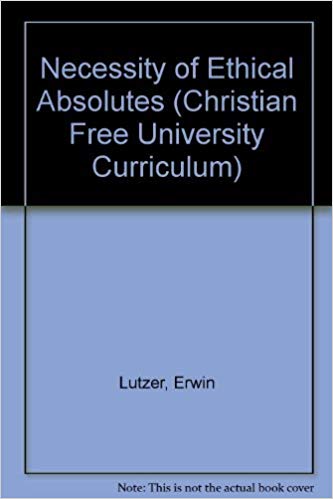A Brief Book Summary from Books At a Glance
About the Author
Erwin Lutzer was the Senior Pastor of Moody Church for three-and-a-half decades. He has written numerous books that have been widely distributed.
Introduction
This book examines several models of humanistic ethics and subjects them to a philosophical critique. Lutzer also presents a biblical model for morality and defends the necessity of God’s character and revelation for ethics. The book provides a succinct, informed treatment of these issues.
Table of Contents
Chapter 1 Searching for Ethical Absolutes
Chapter 2 Cultural Relativism
Chapter 3 Situation Ethics
Chapter 4 Behaviorism
Chapter 5 Emotive Ethics
Chapter 6 Inadequate Absolutes: The Moral Dilemma
Chapter 7 Examining Alternative Absolutes
Chapter 8 Reexamining Traditional Ethics
Response: Mark D. Hanna
Summary
Chapter 1: Searching for Ethical Solutions
It is important for ethics to differentiate between human beings and other species. But these distinctions are being increasingly challenged today. Today, humans are seen as being different from other animals in degree rather than different in kind. The commonalities we share with animals is focused on. The existence of the soul is doubted, and special human dignity is denied. Ethical relativism is rising, and moral values are definitely changing, particularly along generational lines. If we are to know if we are making moral progress, or if we’re going in the wrong direction, we need criteria by which to evaluate actions.
Chapter 2: Cultural Relativism
Different cultures demonstrate a great deal of diversity. When it comes to ethical relativism, cultural relativism is the view that what’s moral is determined by what’s accepted in a given culture. Some cultures allow for polygamy or infanticide, and people simply accept these practices. This has led certain thinkers to conclude that moral values are relative to culture and experience. Yet it seems hard to believe that we should be relativistic about child abuse, murder, or rape. Moving from cultural facts to a theory of morality is to illegitimately fall into the fallacy of trying to get an ought from an is. Materialists cannot explain how value emerges from a collection of non-values.
[To continue reading this summary, please see below....]The remainder of this article is premium content. Become a member to continue reading.
Already have an account? Sign In
Buy the books

THE NECESSITY OF ETHICAL ABSOLUTES, by Erwin Lutzer